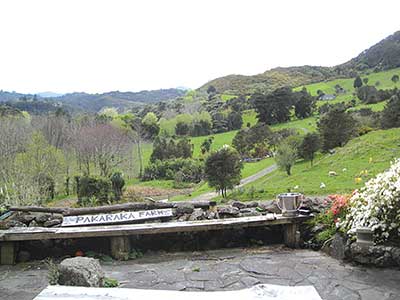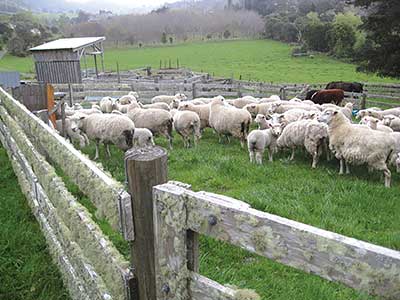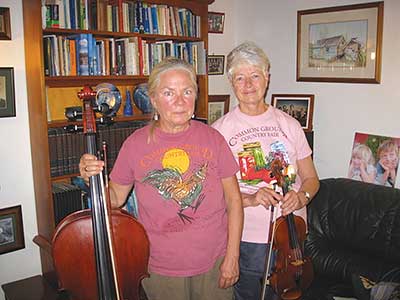 |
| Pakaraka Farm raises beef, sheep and pecans. |
 |
| Mustering the sheep at Pakaraka |
 |
| In addition to working hard in the farm fields at Pakaraka, I played duets with my host, Jeanette (right), every afternoon. |
By Amy LeBlanc
Photos courtesy of the author.
If you had asked me 20 years ago if I would be traveling, and traveling alone all over the world, and WWOOFing, I would definitely have told you that you were nuts!
In 2002, when I was 54, our farm had been certified organic for 10 years, and I took inspector training classes. Through those connections I learned about IFOAM (International Federation of Organic Agriculture Movements) and this organization’s work for organic agriculture in the rest of the world. That was the year some aspects of the USDA National Organic Program came up for debate, with controversy about sludge, manure, etc. I wanted to see how the rest of the world did organic, so I saved up and went off to Victoria, British Columbia, alone, and spent three days on farm tours, several intense days at the IFOAM World Congress and an amazing day at the Butchart Gardens. This was the first time I had traveled alone. It was definitely not glitch free, but I realized that I could solve problems alone. This first congress set a very high bar for subsequent congresses, and I knew I would go again.
So I became a traveler! My husband, Mike, and I went together to the 2005 World Congress in Adelaide, Australia. We went on a whirlwind tour from Sydney, through the Outback, Cairns, and finally to Adelaide for the congress. During breaks from the intense sessions of the congress, I talked with farmers, ranchers, seedsmen, their children – most of whom had attended the School of the Air, an Australian correspondence school. They opened my eyes to the realities of farming and ranching in the Outback – all the things we did not see on the commercial tour.
At a WWOOF (World Wide Opportunities on Organic Farms) booth at the IFOAM trade fair, I learned about opportunities for working at farms in other countries. This was all new to me; the seed was sown!
The value of tourism should not be diminished, but WWOOFing allows a more personal, real and hands-on involvement. It’s an opportunity to be part of a family, its farm, its business and community, and to experience the local culture in a far more down-to-earth and authentic way.
My springboard for WWOOFing became the IFOAM World Congress. The location is determined every three years by IFOAM, competitively, like Olympic venues. In 2008 it was held in Modena, Italy. I learned that you need to join the WWOOF chapter in your country of choice (including, if you choose, the United States), and then, with access to information about all participating farms, you can choose promising places, begin to apply, negotiate, and finally, plan.
My first WWOOF experience was at a small farm outside Modena, called Poggiolrosso. Like most WWOOF hosts/hostesses, Sylvana asked for about five hours of work on work days (not on weekends or other break days) in exchange for room and board and inclusion in all her farm activities. I began by weeding her garden for several days – but I had unknowingly arrived the week before an important celebration: the rededication of the chapel, part of her home, that’s been a sacred space for hundreds of years. As soon as she realized that I am at home in a kitchen, I spent the next week cooking in preparation.
In 2011 the IFOAM World Congress was in Gyeonggi Paldang, outside Seoul, South Korea. This congress stands out for me as the most complete, impressive, interesting, inspiring and educational of all so far. The South Korean organic community built a working farm at the venue, complete with cattle, pigs, chickens, rice paddies and gardens. The congress provided a great day of cultural and farm visits, including an ancient temple, local market, kimchi factory, rice paddy and Asian pear farm. We also learned to make sticky rice – more than I had anticipated!
I began my 2011 plans knowing I would be a timid tourist. I was concerned about Korean food (ingredients/allergies?), language and customs, etc., and decided to WWOOF elsewhere. After checking a map, I went on to WWOOF in New Zealand. This altogether fabulous experience brought home the possibilities of serendipitous connections involving politics, age, music and generosity on the part of my hosts.
Pakaraka Farm, in Thames, at the base of the Coromandel, was a modest operation, raising beef; sheep for wool, meat and market; and pecans for the local health food store. My hostess, Jeanette, had just retired from Parliament as the very active representative of the Green Party. When I emailed her initially at the address provided in the New Zealand WWOOF manual, the email promptly bounced. A Maine friend who WWOOFs in New Zealand regularly had recommended Pakaraka, so I was determined to try again. I snail-mailed an introductory letter mentioning my small organic farm, my seedlings/herbs/tomatoes, and the fact that I play and teach cello. I think Jeanette answered one minute after opening my letter.
I spent a delightful almost two weeks working hard in the fields every day, removing thistles and gorse, mustering sheep, checking fencing – and playing duets with Jeanette every afternoon. Jeanette had picked up her violin after retiring, had jumped at the opportunity to play and even rented a cello for me. She and her partner, Harry, included me in all their activities and meals, and Harry is a great cook.
The amazing postscript to my stay at Pakaraka is that one of my cello students began and ended her 2018 gap year WWOOFing there, including playing her cello with Jeanette.
The 2014 IFOAM Congress was held in Istanbul, Turkey, and Mike again wanted to visit. We enjoyed an altogether too short tour, with folks from all over the world and a great guide. We visited temples, ruins, museums, a rug factory, a leather processing facility, saw the Whirling Dervishes, ate at local restaurants and shopped at the Grand Bazaar in Istanbul. Along the way we drove through miles of spectacular farmland and stopped at several roadside farm stands. I learned that Turkey is self sufficient for food and exports far more that it imports. After the tour I regrouped and enjoyed the intensity of the congress. Thankfully I was also able to enjoy a day walking in the city, visiting shops and soaking up the local energy.
Again, I had planned on being a timid tourist, although I now regret that I didn’t stay longer or work at a farm in Turkey. The Turkish WWOOF chapter, TaTuTa, is small and offers some delightful farm descriptions. Instead, because it was familiar territory and nearby in the travel sense, I returned to Italy to WWOOF. I chose an agriturismo in the Maremma, the hills above the Tuscan coast that is best known for Cinque Terre. I chose Aia del Tufo, a farm there, because of an early tomato variety, ‘Maremmeno’, that I’d been growing for years. The farm is near several ancient towns: Sorano, Sovana, Pitigliano and the thermal baths at Saturnia. I visited all of these great places.
I spent almost two weeks harvesting olives from 300 trees, working with a crew of guys, enjoying two-hour lunch breaks complete with the ubiquitous bottle of red wine. They laughed at me when I cut mine with sparkling water! After a day on the job, I knew I’d made the grade when they began pelting me with olives as kind of initiation.
Despite the many positive parts of my Aia del Tufo experience, my stay also demonstrated one of the pitfalls of WWOOFing. The work day turned out to be a full eight hours with little inclusion in other activities. This was not what I had signed up for, and I have to admit that I didn’t volunteer for any additional “work.” However, I was able to create experiences by asking questions and asking for tours of the other farm activities. The resulting highlight was the visit to the local oil press where I followed the olives I had picked through the entire process, all the way to the finished canned product.
Attending the IFOAM World Congress and using its location as my WWOOFing springboard has enriched my life personally and as a small farmer. The travel has never been 100 percent glitch-free, but people everywhere are glad to help. Along the way I’ve made wonderful friends at every congress and farm.
Through all these congresses and WWOOFing “jobs,” the experiences have added up and given me a new perspective on my “think global, eat local” commitment. WWOOFing allows a form of tourism but with the benefits of authentic local experience, hands-on, working side-by-side with farmers using their techniques, some of which, along with the soil they are working, are centuries old. And I have a richer appreciation for organic, or biologique, as it is called in most of the rest of the world.
Planning Your Trip
I began planning my travels and WWOOFing experiences by joining the specific country WWOOF chapter. Each chapter has an application process and membership fee, which allow access to contact information for each farm. I recommend reading a lot and gradually narrowing your choices. As with all travel plans, you need to take the big picture into consideration: passport, visas, flights, medical insurance, the location and contact information of the nearest U.S. consulate, access to public transportation, phone and/or electronics for communicating with home and with the next farm, the best kind of boots, and that personal care item you can’t live without.
If you are traveling where English is not the first or second language, get a small phrase book and learn a few – especially “Where is the nearest toilet?” I carry a little envelope of emergency flash cards – and they’ve been used!
Here are some helpful resources:
1. Molly Dektar’s blog. This comes across as casual but is loaded with good information.
2. “Top 10 Tips for WWOOFING.” Clear recommendations and good advice from Scarlett Penn, UK WWOOF coordinator
3. “8 Tips for First Time WWOOFer’s” by Scott Hartbeck. This site is a little daunting in its approach, but if you choose your destination first, everything here is awesome. You do not have to join “bootsnall” to plan your WWOOFing experience.
About the author: Amy, with her husband, owns Whitehill Farm in East Wilton, Maine, and she co-coordinates the Exhibition Hall at the Common Ground Country Fair. You can see photos of her WWOOFing experiences at tinyurl.com/ALWWOOF.
